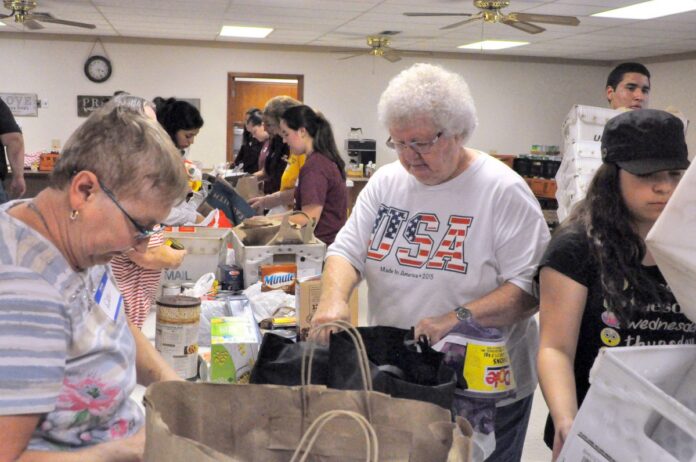HARLINGEN — The canned corn came from a postal delivery route.
So did the brownie mix, the chili, the bottles of applesauce and bag of pasta shells.
And they all ended up on a long row of tables at the Harlingen Food Pantry where volunteers sorted them to be given away to families in need.
“It’s marvelous and this is just the beginning,” said Jim Coffman, a coordinator of the food bank.
The food was being donated to mail carriers, who brought them to the U.S. Post Office where Boy Scouts loaded it onto trucks for delivery to the Harlingen Food Pantry. Then volunteers from Tamayo House, Girl Scout Troop 289 and other entities carried them into the building.
The operation was part of the National Association of Letter Carriers Stamp Out Hunger Food Drive, and Wende Coffman appreciated the outpouring of support.
“It’s vital that we have this help,” said Coffman, another coordinator.
She gestured toward the young people helping out.
“They are young and strong and they make it a whole lot easier,” she said.
Normally, the food pantry purchases more than $3,300 of food per month from the Food Bank of the Rio Grande Valley. The donations, she said, would help alleviate those expenses and enable the food bank to feed 150 to 225 people per month.
“They go around and pick out the food they want,” she said.
Volunteers felt gratified by the chance to help out.
“I feel like it’s broadened me, just being able to come out to contribute,” said Gabby Garza, 15, a member of the Girl Scout Troop.
Daniela Ramos, 17, expressed similar views.
“I feel really good about myself,” she said. “I feel like I am helping my community.”
Meanwhile, United Healthcare in Harlingen held their own drive to help out.
“We’re grateful for the opportunity to work through the Stamp Out Hunger program to contribute food for our neighbors in need,” said Chris Abbott, CEO of United Healthcare Medicare & Retirement in Texas.
“Adequate and nutritious food is essential for health and well-being and addressing the problem of food insecurity is an important part of our commitment to building a healthier community.”




